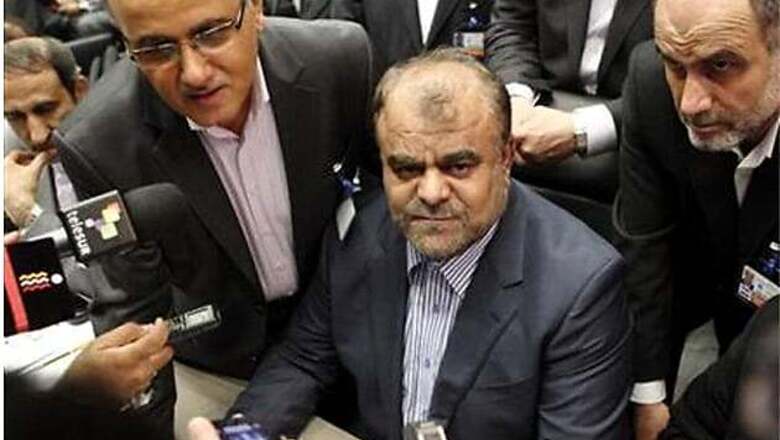
views
Dubai: Iran said on Tuesday it would stop oil exports if pressure from Western sanctions got any tighter and that it had a "Plan B" contingency strategy to survive without oil revenues.
Western nations led by the United States have imposed tough sanctions on the Islamic Republic this year in an attempt to curb its nuclear programme that they say is designed to produce atomic weapons. Tehran says its nuclear plans are peaceful.
"If sanctions intensify we will stop exporting oil," Iranian Oil Minister Rostam Qasemi told reporters in Dubai.
Qasemi's statement is the latest in a series of threats of retaliation by Tehran in response to the sanctions, which have heightened political tensions across the Middle East and, analysts say, led to a sharp drop in Iranian oil exports.
"We have prepared a plan to run the country without any oil revenues," Qasemi said, adding, "So far to date we haven't had any serious problems, but if the sanctions were to be renewed we would go for 'Plan B'.
"If you continue to add to the sanctions we (will) cut our oil exports to the world... We are hopeful that this doesn't happen, because citizens will suffer. We don't want to see European and US citizens suffer," he said, adding that the loss of Iranian oil on the market would drive up oil prices.
Analysts brushed off Qasemi's threat.
"It's just making noise. It would be like cutting off their nose to spite their face," said Leo Drollas, Chief Economist at the Centre for Global Energy Studies.
"Iran needs to export its crude more than other countries need to import it. They are desperate for cash."
Sanctions have already reduced Iran's exports to around 1 million barrels per day (bpd) compared to 2.2 million bpd in 2011. China, India, Japan, South Korea and Turkey now count as Tehran's main buyers.
The US government has focused on blocking Iran's oil exports because it estimates that crude sales provide about half of Iranian government revenues and that oil and oil products make up nearly 80 percent of the country's total exports.
The rial plunged by about a third against the US dollar in the week to October 2, reflecting a slide in oil income wrought by tightened sanctions over summer aimed at pressuring Tehran to drop its nuclear programme.
How long the economy could function without selling any oil is unclear, but Iran has large currency reserves accumulated over decades as one of the world's largest oil suppliers.
"What else can they export to generate the necessary revenues?" Carsten Fritsch of Commerzbank said in the Reuters Global Oil Forum.
Because of the slide in the rial and oil export earnings, the government is already moving onto an austerity footing, cutting imports of non-essential goods and urging its citizens to buy fewer foreign products.
Iran has in the past said it could shut the vital shipping lane of Hormuz at the head of the Middle East Gulf. However, a large Western naval force sent to keep open the route, through which about a third of the world's seaborne oil exports pass might be a large obstacle to such an attempt.
Production capacity
Earlier on Tuesday, Qasemi said Iran was still producing 4 million barrels per day (bpd), rejecting reports the country's output has fallen to around 2.7 million bpd.
According to the latest secondary source estimates published by the Organization of the Petroleum Exporting Countries, Iran pumped just 2.72 bpd in September, and Iran's own data submitted to OPEC showed the country produced 3.75 million bpd in August.
The International Energy Agency (IEA) estimates that Iranian exports fell to a new low of 860,000 bpd in September, down from 2.2 million bpd at the end of 2011.
Assuming a crude oil price of $110, such a sharp drop means Iran making just $95 million dollars from daily crude sales last month, about $147 million less every day than it was making late last year.
Nevertheless, Qasemi said Iran was pumping oil at full capacity and refining more of its own oil to meet domestic demand.
"It is currently 4 million barrels per day," he said, declining to give export figures.
"Iran has been facing US sanctions for 30 years while sucessfully managing its oil sector," he said.
He said Iran's refining capacity was now 2 million barrels per day (bpd) with another 200,000 bpd of capacity to be added before the end of Iranian year next March.
The increase in refining capacity had already ended Iran's need to import vehicle fuel and could soon drive a boom in fuel exports, the minister said.
"Our daily consumption of petrol (gasoline) is 90 million litres ... Earlier, a big portion of that was being imported but we no longer import products," he said.
"Right now, we not only don't import but we also export some products ... there are always customers for Iranian oil.
"By the end of the Iranian year they will reach their maximum capacity and then we can export more Iranian oil products," he said.



















Comments
0 comment